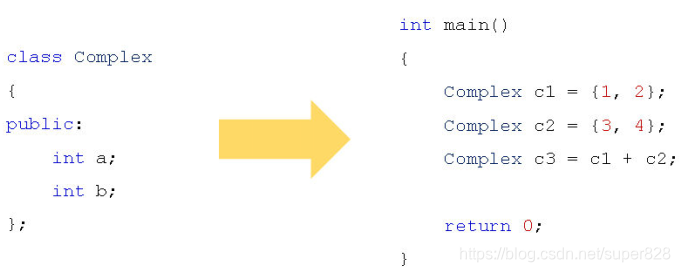【C++深度剖析学习总结】 23 操作符重载
所谓重载,就是赋予新的含义。函数重载(Function Overloading)可以让一个函数名有多种功能,在不同情况下进行不同的操作。运算符重载(Operator Overloading)也是一个道理,同一个运算符可以有不同的功能。
实际上,我们已经在不知不觉中使用了运算符重载。例如,+号可以对不同类型(int、float 等)的数据进行加法操作;<<既是位移运算符,又可以配合 cout 向控制台输出数据。C++ 本身已经对这些运算符进行了重载。
C++ 也允许程序员自己重载运算符,这给我们带来了很大的便利。
下面的代码定义了一个复数类,通过运算符重载,可以用+号实现复数的加法运算:
-
#include <iostream>
-
using namespace std;
-
-
class complex{
-
public:
-
complex();
-
complex(double real, double imag);
-
public:
-
//声明运算符重载
-
complex operator+(const complex &A) const;
-
void display() const;
-
private:
-
double m_real; //实部
-
double m_imag; //虚部
-
};
-
-
complex::complex(): m_real(0.0), m_imag(0.0){ }
-
complex::complex(double real, double imag): m_real(real), m_imag(imag){ }
-
-
//实现运算符重载
-
complex complex::operator+(const complex &A) const{
-
complex B;
-
B.m_real = this->m_real + A.m_real;
-
B.m_imag = this->m_imag + A.m_imag;
-
return B;
-
}
-
-
void complex::display() const{
-
cout<<m_real<<" + "<<m_imag<<"i"<<endl;
-
}
-
-
int main(){
-
complex c1(4.3, 5.8);
-
complex c2(2.4, 3.7);
-
complex c3;
-
c3 = c1 + c2;
-
c3.display();
-
-
return 0;
-
}
运行结果:
6.7 + 9.5i
本例中义了一个复数类 complex,m_real 表示实部,m_imag 表示虚部,第 10 行声明了运算符重载,第 21 行进行了实现(定义)。认真观察这两行代码,可以发现运算符重载的形式与函数非常类似。
运算符重载其实就是定义一个函数,在函数体内实现想要的功能,当用到该运算符时,编译器会自动调用这个函数。也就是说,运算符重载是通过函数实现的,它本质上是函数重载。
运算符重载函数除了函数名有特定的格式,其它地方和普通函数并没有区别。
上面的运算符重载还可以有更加简练的定义形式:
-
complex complex::operator+(const complex &A)const{
-
-
return complex(this->m_real + A.m_real, this->m_imag + A.m_imag);
return 语句中的
complex(this->m_real + A.m_real, this->m_imag + A.m_imag)
会创建一个临时对象,这个对象没有名称,是一个匿名对象。在创建临时对象过程中调用构造函数,return 语句将该临时对象作为函数返回值。
在全局范围内重载运算符
运算符重载函数不仅可以作为类的成员函数,还可以作为全局函数。更改上面的代码,在全局范围内重载+,实现复数的加法运算:
-
#include <iostream>
-
using namespace std;
-
-
class complex{
-
public:
-
complex();
-
complex(double real, double imag);
-
public:
-
void display() const;
-
//声明为友元函数
-
friend complex operator+(const complex &A, const complex &B);
-
private:
-
double m_real;
-
double m_imag;
-
};
-
-
complex operator+(const complex &A, const complex &B);
-
-
complex::complex(): m_real(0.0), m_imag(0.0){ }
-
complex::complex(double real, double imag): m_real(real), m_imag(imag){ }
-
void complex::display() const{
-
cout<<m_real<<" + "<<m_imag<<"i"<<endl;
-
}
-
-
//在全局范围内重载+
-
complex operator+(const complex &A, const complex &B){
-
complex C;
-
C.m_real = A.m_real + B.m_real;
-
C.m_imag = A.m_imag + B.m_imag;
-
return C;
-
}
-
-
int main(){
-
complex c1(4.3, 5.8);
-
complex c2(2.4, 3.7);
-
complex c3;
-
c3 = c1 + c2;
-
c3.display();
-
-
return 0;
-
}
1.需要解决的问题
下面的复数解决方案是否可行?

复数的加法操作
-
#include <stdio.h>
-
class Complex
-
{
-
int a;//hide variable
-
int b;
-
public:
-
Complex(int a = 0, int b = 0)
-
{
-
this->a = a;
-
this->b = b;
-
}
-
-
int getA()
-
{
-
return a;
-
}
-
-
int getB()
-
{
-
return b;
-
}
-
-
friend Complex Add(const Complex& p1, const Complex& p2);
-
};
-
Complex Add(const Complex& p1, const Complex& p2)
-
{
-
Complex ret;
-
-
ret.a = p1.a + p2.a;
-
ret.b = p1.b + p2.b;
-
-
return ret;
-
}
-
int main()
-
{
-
Complex c1(1, 2);
-
Complex c2(3, 4);
-
Complex c3 = Add(c1, c2); // c1 + c2
-
-
printf("c3.a = %d, c3.b = %d\n", c3.getA(), c3.getB());
-
-
return 0;
-
}
2.思考
Add函数可以解决Complex对象相加的问题,但是Complex是现实世界中确实存在的复数,并且复数在数学中的地位和普通的实数相同。
为什么不让+操作符也支持复数相加呢?
3.操作符重载
C++中的重载能够扩展操作符的功能
操作符的重载以函数的方式进行
本质:
用特殊形式的函数扩展操作符的功能
通过operator关键字可以定义特殊的函数
operator的本质是通过函数重载操作符
语法:

Sign为系统中预定义的操作符,如:+,-,*,/,等
操作符重载初探--全局函数版本的实现
-
#include <stdio.h>
-
class Complex
-
{
-
int a;
-
int b;
-
public:
-
Complex(int a = 0, int b = 0)
-
{
-
this->a = a;
-
this->b = b;
-
}
-
-
int getA()
-
{
-
return a;
-
}
-
-
int getB()
-
{
-
return b;
-
}
-
-
friend Complex operator + (const Complex& p1, const Complex& p2);//友元函数
-
};//类定义之后又;
-
-
Complex operator + (const Complex& p1, const Complex& p2)
-
{
-
Complex ret;
-
-
ret.a = p1.a + p2.a;
-
ret.b = p1.b + p2.b;
-
-
return ret;
-
}
-
-
int main()
-
{
-
Complex c1(1, 2);
-
Complex c2(3, 4);
-
Complex c3 = c1 + c2; // operator + (c1, c2)
-
-
printf("c3.a = %d, c3.b = %d\n", c3.getA(), c3.getB());
-
-
return 0;
-
}
可以将操作符重载函数定义为类的成员函数
-
- 比全局操作符重载函数少一个参数(左操作数)this充当左操作数
-
- 不需要依赖友元就可以完成操作符重载
-
- 编译器优先在成员函数中寻找操作符重载函数

成员函数重载操作符--成员函数调用
-
#include <stdio.h>
-
class Complex
-
{
-
int a;
-
int b;
-
public:
-
Complex(int a = 0, int b = 0)
-
{
-
this->a = a;
-
this->b = b;
-
}
-
-
int getA()
-
{
-
return a;
-
}
-
-
int getB()
-
{
-
return b;
-
}
-
-
Complex operator + (const Complex& p) //成员函数版本---优先调用
-
{
-
Complex ret;
-
printf("Complex operator + (const Complex& p)\n");
-
ret.a = this->a + p.a;
-
ret.b = this->b + p.b;
-
-
return ret;
-
}
-
-
friend Complex operator + (const Complex& p1, const Complex& p2);
-
};
-
-
Complex operator + (const Complex& p1, const Complex& p2) //全局函数版本
-
{
-
Complex ret;
-
printf("Complex operator + (const Complex& p1, const Complex& p2)\n");
-
ret.a = p1.a + p2.a;
-
ret.b = p1.b + p2.b;
-
-
return ret;
-
}
-
-
int main()
-
{
-
Complex c1(1, 2);
-
Complex c2(3, 4);
-
Complex c3 = c1 + c2; // c1.operator + (c2) ,通过成员函数实现
-
-
printf("c3.a = %d, c3.b = %d\n", c3.getA(), c3.getB());
-
-
return 0;
-
}
小结
操作符重载是C++的强大特性之一
操作符重载的本质是通过函数扩展操作符的功能
operator关键字是实现操作符重载的关键
操作符重载遵循相同的函数重载规则
全局函数和成员函数都可以实现对操作符的重载
文章来源: allen5g.blog.csdn.net,作者:CodeAllen的博客,版权归原作者所有,如需转载,请联系作者。
原文链接:allen5g.blog.csdn.net/article/details/117452621
- 点赞
- 收藏
- 关注作者


评论(0)